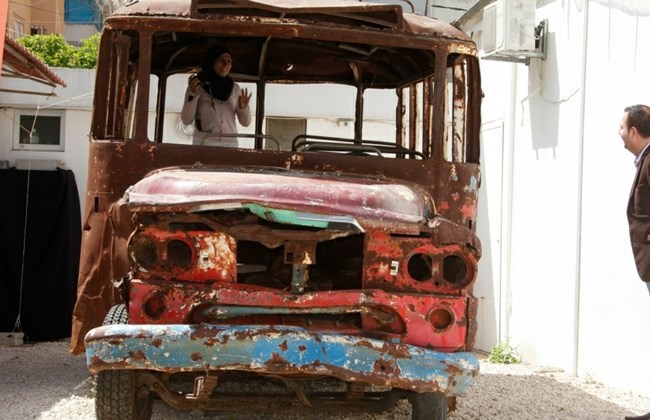April 13, 1975: A tragedy to remember
Hiba Huneini/The Daily Star/Apr. 09, 2015
Forty years ago on April 13, 1975, the Civil War broke out to push Lebanon, the most stable democratic state in the Arab World at that time, into a vicious circle of internal battles. It erupted due to internal and external factors, and was ended by an accord of national agreement, under the patronage of martyr Prime Minister Rafik Hariri, Arab auspices and international support in the town of Taif, Saudi Arabia. This agreement constituted a specific historical juncture that paved the way to the new phase of stability and prosperity in the country.Decades have passed after the end of the war, nevertheless, its effects on the Lebanese people can still be touched. It has become part of the social narrative even among the new generation that did not experience its warfare. The effects that the war had on the psychology, fabric, form and function of the Lebanese society are key factors toward understanding its current situation and determining the kind of social choices it needs to take in the future.
The war had a detrimental impact on our social fabric. It resulted in a radical social segregation based on sectarian divide. The hostilities’ demarcation lines remained, until today, as geographical borders and boundaries between the habitants of every sect making social infusion impossible. This has automatically laid the foundation for a trajectory of social and political polarization that’s lasting until today. This “polarized-segregation” has led to a dangerous social setting where one feels more connected to her/his sect than her/his country.
On the other hand, the horror of warfare has been an influential component on our social psychology. It keeps coming up to the surface at times of tension. Although it is a memory full of bloodshed and destruction, it has prevented us from flaming another war. Contrary to the conventional narrative, Lebanon’s painful experience has resulted in a country that can handle an extraordinary amount of stress. For example, we were able to resist the Israeli aggression and to reconstruct our country.
We also managed to absorb the spillovers of the regional conflicts in all its different forms and to resist any effort done to import them into our territory. Nevertheless, we continued to keep our human and moral stances by hosting an incredible number of refugees to find shelter, hospitality and share the limited resources of our small country.
Now, the question is, in the memory of the Civil War, what needs to be done to remove violence from the menu of options for any emerging internal conflict?
There is an action-oriented and multidimensional answer to this question. But before answering, one should understand that the notion of a conflict-free society is a naive one. Societies do have internal conflicts often if not all the time, what matters is the magnitude these conflicts on citizens’ livelihood and the conflict resolution tools. Modern, democratic and civilized nations should not consider violence as an option for conflict settlement and do not compromise their citizens’ welfare for warfare. Therefore, the answer of the above question is basically rooted into the restoration of civil-democratic state, good governance and a reconciliation process.
First, reconciliation is where it all starts. It is a nonlinear over-arching process to transform the people’s divided past to a shared future. Truth-seeking and justice are the interrelated ingredients in any reconciliatory process to heal our wounds and rebuild trust. However, in a sectarian society like the Lebanese one, this reconciliatory process is easier said than done.
It implies a lot of rational choices from the sectarian and political leaders based on a collective decision to invest in our common future not in our divided past. It requires a decision that is based on hope, not fear. Second, in order for Lebanon to stabilize and prosper, true democracy should be restored on the basis of a civil state that does not allow discrimination between its citizens on any sectarian, ethnic or gender basis. Third, a coherent structure of good governance should be put in place in order to prevent cronyism and rent-seeking. This is supposed to return efficiency back to the state institutions, and hence, restore people’s trust, renew its legitimacy and make it able to deliver.
In conclusion, it is mind-blowing how Lebanon needs to remember its painful history as much as it needs to forget it. We need to actively engage with our mistakes, think forward and be driven by hope not fear, as Martin Luther King said, “those who do not learn to live together as brothers are all going to perish together as fools.”
**Hiba Huneini is acting manager of the Youth & Civic Engagement Program at the Hariri Foundation for Sustainable Human Development.



















